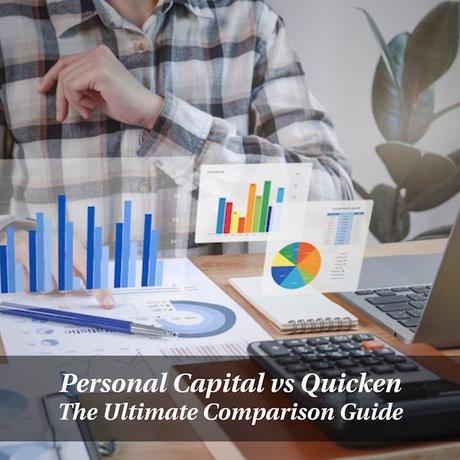
Are you tired of manually tracking your finances? Do you want to simplify your financial life with the help of technology? Look no further than Personal Capital and Quicken. These two financial management tools have revolutionized the way people track their money, but which one is right for you? In this ultimate comparison guide, we'll dive into the similarities and differences between Personal Capital vs Quicken so that you can make an informed decision on which tool best fits your needs.
Comparing Personal Capital vs Quicken
Personal Capital and Quicken are two popular financial management tools that offer a variety of features to help users track their finances. While Personal Capital vs Quicken both allow users to connect all their accounts in one place, there are significant differences between the two.
One major difference is the pricing model. Personal Capital offers free account aggregation, budgeting tools, investment tracking and retirement planning. However, premium services such as advanced investment management come with an advisory fee starting at 0.89%. On the other hand, Quicken charges a one-time fee for its software ranging from $34.99 to $99.99 depending on the plan selected.
Another key difference is in user interface and ease of use. Personal Capital provides sleek visuals that make it easy for users to understand their overall financial picture without getting lost in complex details or overwhelming charts and graphs. Meanwhile, Quicken's interface can be more complicated but provides extensive customization options that allow users full control over how they view their data.
Ultimately, whether you choose Personal Capital vs Quicken largely depends on your preferences regarding cost versus customizability and simplicity versus complexity.
Personal Capital Overview
Personal Capital is an online financial management platform that helps users manage their personal finances. The platform offers a range of tools and features to help users track their spending, create budgets, and plan for retirement.
One of the key features of Personal Capital is its investment tracking tool, which allows users to monitor all of their investments in one place. Users can also get access to personalized investment advice from a team of financial advisors at Personal Capital.
In addition to investment tracking, Personal Capital also offers budgeting tools that allow users to set goals and track their progress over time. The platform will automatically categorize transactions based on spending habits so that users can see where they are overspending or under-spending.
Another notable feature of Personal Capital is its retirement planning tool. This tool calculates how much money a user needs to save each year in order to reach their retirement goal. It takes into account factors such as age, income, and current savings balance.
Personal Capital is an excellent choice for anyone looking for a comprehensive financial management platform with robust investment tracking capabilities and personalized advice from financial experts.
Quicken Overview
Quicken is a personal finance management tool that has been around since 1983. It is one of the most popular finance software programs available, with over 17 million users worldwide.
The software offers a range of features to help manage finances, including budgeting tools, investment tracking, bill management and payment reminders. Quicken also allows users to create customized financial reports based on their individual needs.
One of the key benefits of using Quicken is its ability to connect directly to bank accounts and credit cards. This makes it easy for users to track their spending in real-time and keep up-to-date with all their financial transactions.
Another great feature offered by Quicken is its mobile app which allows users to access all their financial data from anywhere at any time. The app provides an overview of account balances, recent transactions and upcoming bills.
The Similarities between Personal Capital and Quicken
Both Personal Capital and Quicken are personal finance management tools that help users manage their finances in one place. Personal Capital and Quicken both offer a range of features that allow users to track their spending, investments, and budget.
One similarity between the Personal Capital vs Quicken is the ability to link all financial accounts in one place. This includes bank accounts, credit cards, investments and loans. Users can easily view a comprehensive overview of their finances without logging into multiple platforms.
Another similarity is the use of graphs and charts to visualize data. Both applications have interactive dashboards that display financial information in an easy-to-understand manner.
Furthermore, they both offer investment tracking tools such as portfolio analysis and performance reports. Users can monitor how well their investments are performing over time using these features.
Both applications provide secure access with multi-factor authentication options for enhanced security when logging in to your account online or via mobile app.
While there are some differences between Personal Capital vs Quicken software solutions mentioned earlier; there are also several similarities between them which make them great choices for managing personal finance effectively at different levels depending on each user's needs!
The Differences Between Personal Capital and Quicken
Personal Capital and Quicken are both excellent financial management tools, but they differ in several ways. For one, Personal Capital is primarily geared towards investment management while Quicken provides a more comprehensive view of your overall finances.
Quicken has been around for quite some time and offers many features that allow you to manage your budget, bills, investments, and even loans all in one place. It allows you to track multiple accounts, categorize transactions easily through automation or manual entry and create custom reports with charts and graphs.
On the other hand, Personal Capital is designed to help investors keep tabs on their portfolio performance. The platform offers robust investment tracking tools like monitoring fees paid on mutual funds or ETFs compared to industry averages as well as suggesting improvements based on risk tolerance levels.
Another key difference between the two platforms lies in how they charge users for their services. While Quicken typically requires a subscription fee ranging from $35-$100 per year depending on plan type; Personal Capital charges clients an annual advisory fee of 0.89-0.49% of assets under management (AUM).
In terms of user interface design, Quicken's dashboard can be customized according to individual preferences by adding relevant widgets whereas Personal Capital's interface is relatively simple yet sleek providing insights into portfolios' allocation such as stocks vs bonds along with detailed analysis reports.
Ultimately which platform you choose depends entirely upon your needs – if you're looking for comprehensive financial management software then Quicken might be best suited whereas if investing interests dominate personal finance goals then Personal capital may serve better
Which One Should You Choose?
When choosing between Personal Capital and Quicken, it ultimately comes down to your personal financial needs and preferences.
If you're looking for a free tool that focuses on investment management with added features like retirement planning, then Personal Capital may be the better choice for you. However, if you prefer a more comprehensive approach to managing all aspects of your finances including budgeting and bill payment tracking, then Quicken might be the way to go.
Personal Capital also offers personalized investment advice from real advisors at a cost while Quicken provides basic money management tools without any additional fees. If customer support is important to you, both offer assistance via phone or email but Personal Capital has limited hours compared to Quicken's 24/7 support.
Ultimately, it's important to compare the features of each program against what matters most in your financial life before making a decision.
Conclusion
After comparing Personal Capital vs Quicken, it's clear that both platforms offer unique features to help users manage their finances.
Personal Capital is a fantastic option for those who prioritize investment management and retirement planning. The platform offers in-depth analysis of your investments, helping you make informed decisions about your portfolio.
On the other hand, Quicken is an excellent choice for people looking for a comprehensive solution to manage all aspects of their finances. It helps users create budgets, pay bills on time, track expenses and even plan their taxes.
Ultimately, the right choice between Personal Capital vs Quicken depends on individual needs and preferences. However, if you're someone who values investment management more than anything else – go with Personal Capital. While if you want an all-in-one financial management tool – choose Quicken.
In conclusion (just kidding!), whatever platform you end up choosing - having a personal finance tool like this at your disposal can be life-changing when it comes to managing your money wisely!

